DEI ban restricts cultural organizations
Students say they endure censorship
Angel Valsin held a card against her head while shouting guesses as members of the Black Student Union on South Campus waved their hands around, calling out clues to the prompt.
The group had a game day to celebrate Black History Month in one of the few ways they could.
“I wish we were allowed to do more,” said Angel Valsin, BSU’s president.
BSU faced complications when attempting to schedule events for Black History Month, and while the student organization fought for their month long celebration, the club’s future remains uncertain.
“We want people to know this is an organization that teaches Black culture, but we can’t even use words like Black,” Valsin said.
Senate Bill 17, signed by Gov. Greg Abbott and put into effect last year, prohibits state funding of di-
DISTRICT
ICE officers continue to create worry
LAUREN HARPER
multimedia editor lauren.harper903@my.tccd.edu
Students and staff are preparing for increased immigration enforcement in schools following new executive orders from President Trump’s administration.
Former President Biden’s “Guidelines for Enforcement Actions in or Near Protected Areas,” prohibited the Department of Homeland Security from enforcing immigration policies in or around locations deemed “protected areas,” such as schools and childcare centers.
This policy was rescinded following Trump’s second inauguration on Jan. 20.
In a statement released by the DHS, acting secretary Benjamine Huffman said homeland security officers have the right to determine what action can be taken in these sensitive areas.
“Going forward, law enforcement officers should continue to use that discretion along with a healthy dose of common sense,” his statement read. “It is not necessary, however, for the head of the agency to create bright-line rules regarding where our immigration laws are permitted to be enforced.”
SE nursing student and Spanish club member Miguel Brito is looking to school administrators for answers.
As a first-generation citizen, he said he was concerned when he came up empty-handed while looking for updates on TCC’s website for information concerning the executive orders.
“As a student who has family who came in illegally, it makes me nervous for the future,” he said.
“When I graduated high school, there were still students who were undocumented. They wanted to go to college, and now they have the potential to be removed from school.”
Brito said he knows people who are directly impacted by the stricter immigration policies
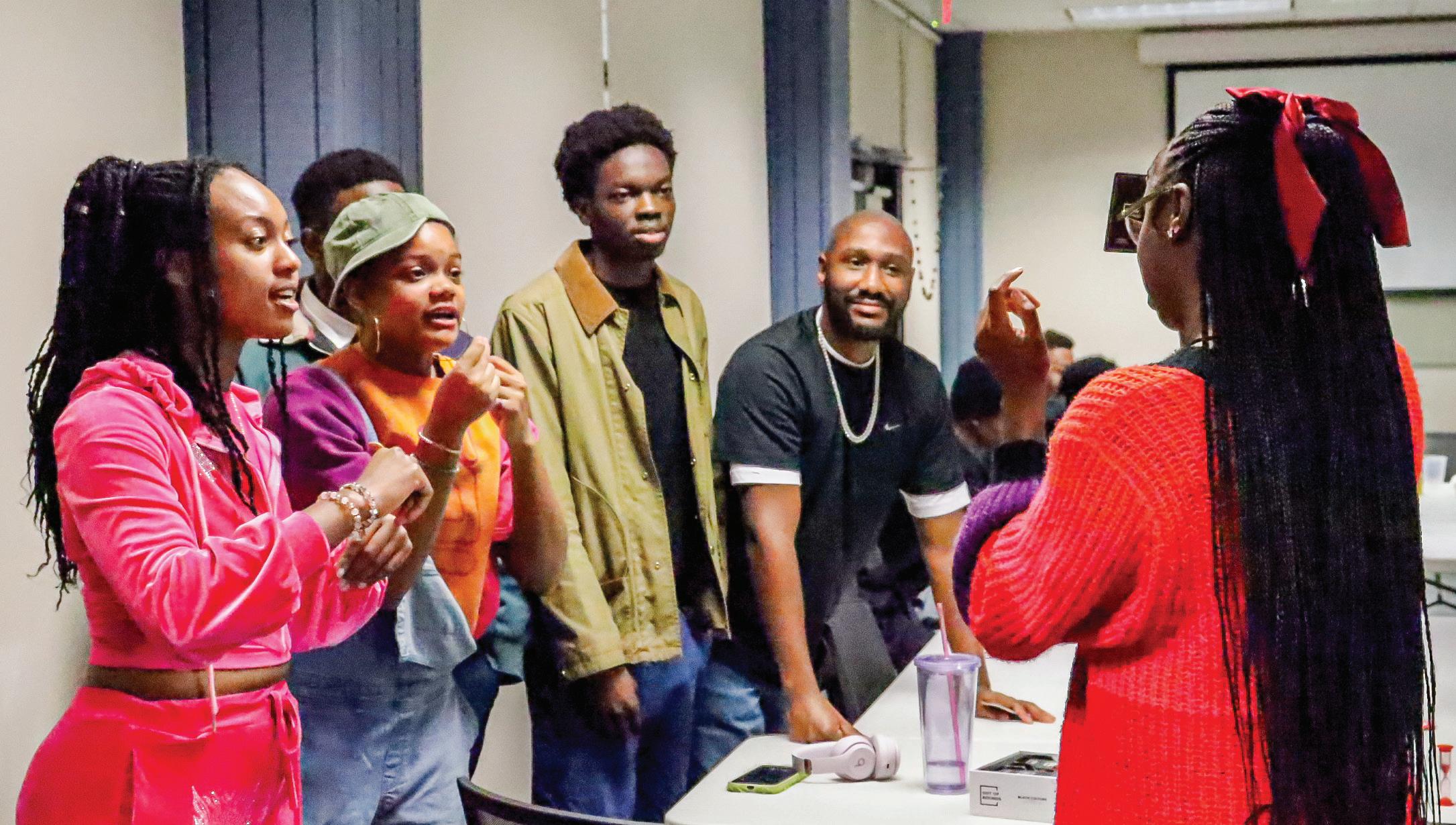
versity, equity and inclusion programs, inhibiting organizations like BSU to easily host events.
Sponsors of the student clubs, formally referred to as advisers, are the most restricted by the bill.
When approached for questioning, BSU’s sponsor said she did not want to speak to The Collegian.
“She can’t say anything because it can jeopardize her job,” Valsin said. “They’re not able to
DISTRICT
talk and be active, and it kind of makes it harder.”
Club Vice President Jahson Anderson said it requires cultural events to be controlled and led by students without much guidance.
“We have to take it as a governmental process, like you have to provide proposals and logistics to everything we want, even if it’s just a regular meeting,” Anderson said.
TCC hasn’t listed any of
BSU’s events for Black History Month on the website’s calendar, and the organization had issues when sending Student Activities their designs for flyers to be printed.
“We can send what we want, but they might not [print] it,” Anderson said. “They have new rules they have to follow too.”
The governor has argued that DEI programs violate both the fed-
eral and state constitutions.
“Most DEI programs say we’re going to have a special program for students of or people of this particular race or that particular race. That’s totally unconstitutional,” Abbott said when asked by CBS News Texas what he would say to those who may feel targeted by his policy. Since the bill was signed into law in 2023, some BSU members have seen a decrease in the presence of cultural activities across TCC campuses, which concerns them.
Valsin said she believes students can understand other people’s behavior by learning about different cultures and not viewing what may be foreign to them as taboo.
For example, BSU has run into problems marketing any of its events during Black History Month. BSU member Lauryn Sample said it was from having the word “Black” in its event titles. Anderson said it was because of the design on their flyers, which included the word “Black.” Valsin said it was because the organization’s name contained the word “Black.”
“Culture is a big part of people. The fact that we can’t express ours the way we want makes it like, that’s not freedom,” Valsin said. “Black is a word. It’s a race. It’s what we are.”
See BSU, page 2
Students meet state leaders at Capitol
FOUSIA ABDULLAHI editor-in-chief fousia.abdullahi@my.tccd.edu
TCC students pressed state leaders on issues such as funding, immigration, diversity, equity and inclusion during Community College Day Feb. 3 at the Texas Capitol Building in Austin.
Students from each campus met with some of their state senators and representatives along with their aides.
The group was taken by bus to the Capitol. Once there, students had a chance over breakfast to mingle with other community college students from across the state.
Before the event, they made appointments to meet with individual legislators. A coordinator for student activities chaperoned each student group.
A group of students met with Rep. David Lowe, R-North Richland Hills District 91, one of the newest legislators in the session that started last month. TCC board trustee Shannon Wood and on-call coordinator of special projects Bill Lace also attended the meeting.
“Meeting them in person feels real,” SE student Rosemary Adio said. “It’s no longer on the website. It’s no longer on TV. So, you know, you can now put a face to the person and probably relate with that person.”
NORTHEAST
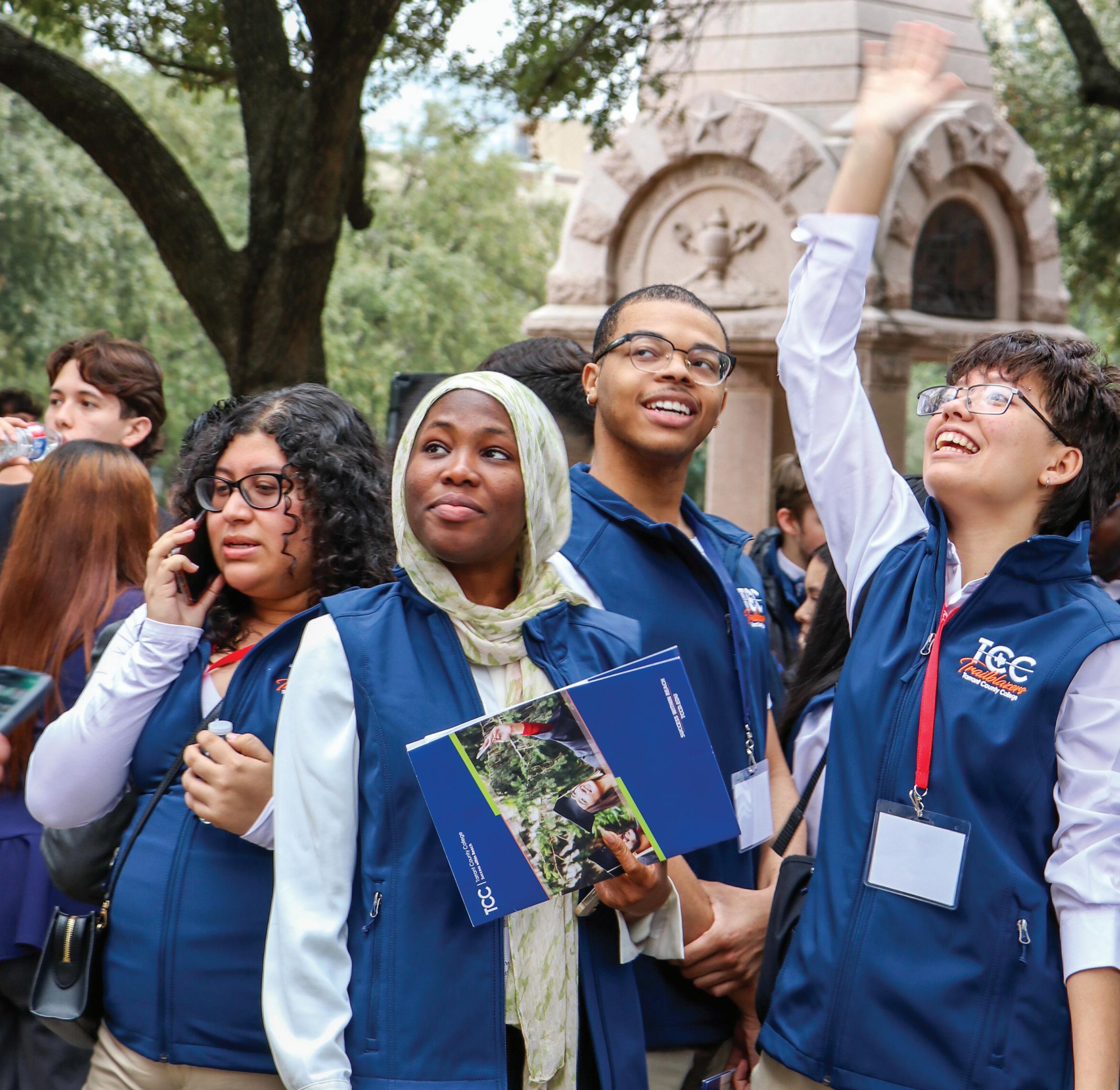
SE Student Government Association
and Asia Barfield stand in front of the state capital
NE Dental Programs source of strong community
HUDA QURESHI managing editor
huda.qureshi@my.tccd.edu
Students and faculty come to TCC’s two dental programs for different reasons, but the overlapping goal is helping people and each other.
For first-year dental student Abby Amaya, the road to becoming a dental hygienist means providing the care she didn’t receive growing up.
“I just wanted to help my family get into dental care, so that way
they don’t have to struggle whenever they get older,” she said.
She said the program offers a supportive environment where she can learn the necessary skills to reach her goals. Even though it can be stressful at times, she said once you’re in the program you have the support available to make it to the end.
“Everyone’s in that program to gain more knowledge,” she said. “Everyone’s going to be learning new things. It’s kind of a built-in family with your classmates, and everyone’s just trying to help everyone out.”
Ashley Emery, who graduated last year, said the dental program became her safe space. She didn’t have the best home life growing up and her education was able to provide her with a sense of identity.
“I was surrounded by people who wanted me to be successful, who were there to support me,” she said. “I had endless opportunities and support. I had everything that I could need. I just had to show up for myself.”
The program is set up to have a selective admission system with 16 students per dental assistant cohort and 24 students per dental hygiene
cohort. These students go through two years of curriculum together and become close, Emery said. She said hardship is inevitable, but the community offers a big support.
“We had some people who went through some really hard breakups,” she said. “We had some people go through divorces. We had some people who had miscarriages. We had some people who lost their parents to COVID, some people who experienced some other tragedies and deaths. … When you go through these things, these are the people that you can lean on.”
Escape room shows anxiety signs
Students learn how to cope under pressure
DIEGO COLLAZO
campus editor
diego.collazo@my.tccd.edu
South Campus counselors hosted an escape room experience Feb. 4-5 designed to test students’ problem-solving skills while teaching them how to navigate anxiety in real time.
Participants had to work together to solve puzzles under timed pressure, mirroring the high-stakes moments that often trigger anxiety.
Counselor Creshendle Antonio said immersing students in real-life scenarios encourages critical thinking and problem-solving in a supportive and educational environment.
The escape room took place in the “Fusion Room,” a big open space transformed into a high-pressure environment. The setting featured designated challenge zones, a countdown timer and strategically placed puzzles that required teamwork and quick thinking.
The puzzles were set up in four separate corners of the room, each decorated to match the challenge’s theme.
Antonio said this interactive approach aimed to not only deepen students’ understanding of anxiety but also to foster empathy and equip them with practical coping strategies.
“A lot of people have challenges with anxiety,” Antonio said. “This hands-on format allows us to educate students on the physiological effects of anxiety in a fun and interactive way. But more importantly, to teach students how to win those battles with anxiety.”
Anxiety is a widespread issue among college students with 63% of them experiencing overwhelming stress, according to Har-
vard Health Publishing.
South Campus student Deyna Posada said she is one of many students who have struggled with anxiety.
“Being in college can be very stressful,” Posada said. “I once got a fever from stress. I try to stop what’s causing the stress by listening to music and talking to my mom and the people I love.”
Her experience is not unique. Fellow South Campus student Jacob Núñez shared how he manages high stress situations using a sensory grounding technique.
“When I’m in high-anxiety moments, I use the five senses trick that I learned,” Núñez said. “Acknowledge five things you can see, four things you can touch, three things you can hear, two things you can smell and one thing you can taste.”
By stepping away from traditional lecture-style events, counselors hoped students would recognize their anxiety symptoms more effectively.
Some common symptoms include sweaty hands, shaking and trouble sleeping, according to the World Health Organization.
Antonio said events like the escape room aim to address a growing need for accessible mental health education.
One of the puzzles at the event included a virtual reality experience where students worked together to defuse a bomb. Núñez said he noticed some unhelpful responses to what he said was the most stressful part of the escape room.
“A big takeaway was speaking when needed,” Núñez said. “I found silence to be very unhelpful when we were trying to defuse the bomb, and it only increased the stress.”
Antonio said she was happy to see students working together and learning throughout the activity. With student engagement high and positive feedback from participants, she is now considering ways to expand the interactive approach to mental health awareness.
For those struggling, TCC campus counseling services offer four-six free counseling sessions per semester to students, according to the TCC website.
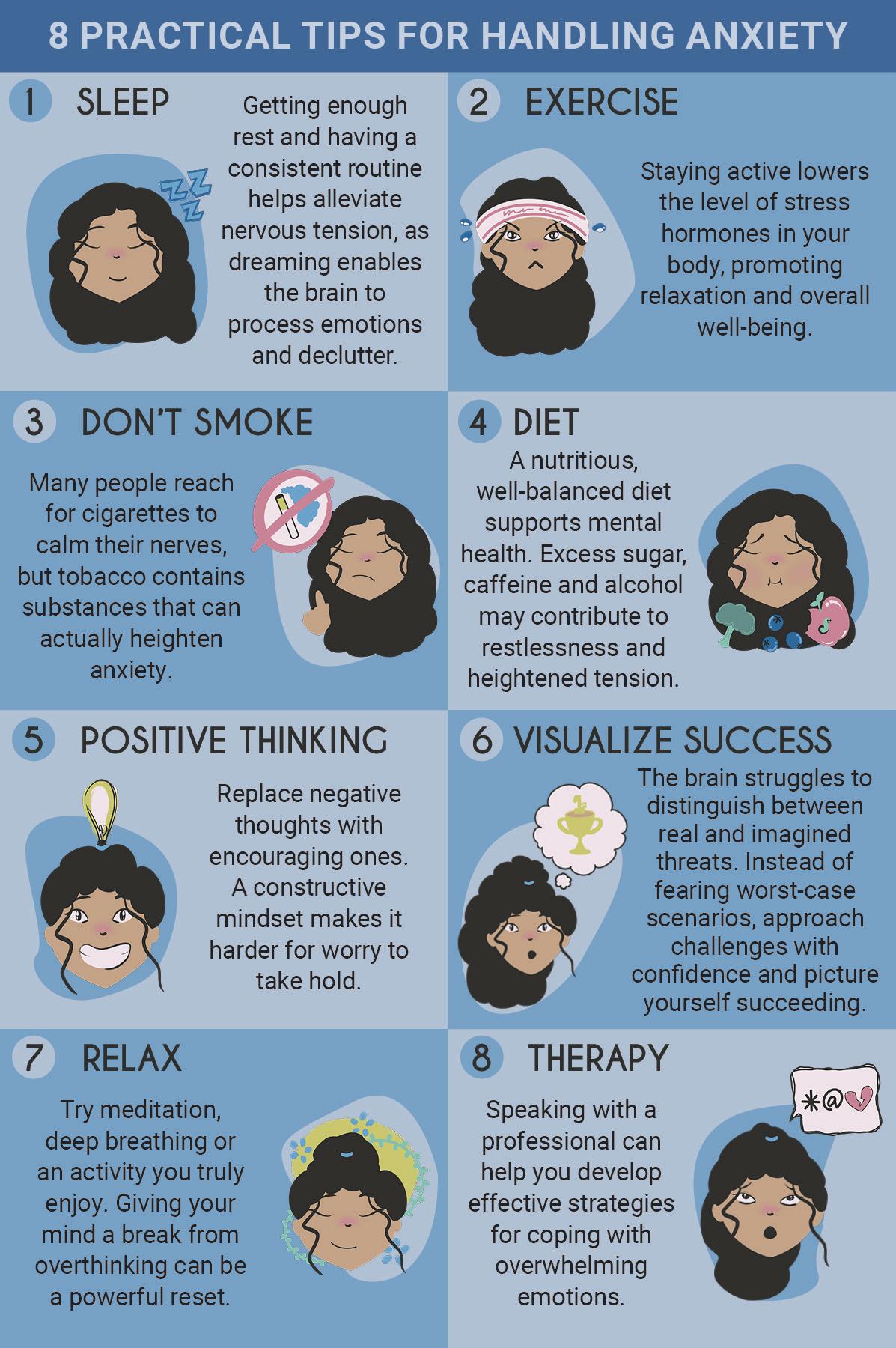
Networking can lead to beneficial opportunities
CHEYENNE SHAWN
campus editor cheyenne.shawn@my.tccd.edu
NE business instructor Freddie Sandifer Jr. spoke to students on Feb. 5 about how building your social capital through networking can have endless benefits in every area of your life.
Social capital is defined as a group of people, an organization or society working together effectively to achieve a common goal.
Sandifer Jr. said social capital has three concepts for it to function: resources, network structure and network relationships. An example given to how people can practice social capital is by learning different ways of talking and communicating with other people.
“My first professional job at TCC happened because I knew how networking had a social task,” Sandifer Jr. Said.
The presentation highlighted social networking, with an emphasis on how it provides access through resources embedded in relationships.
“It’s important to network,” NE student Dustin Ebey said. “To build relationships with those even if you don’t know them, and to be less, or to at least try to attempt to, counter any kind introversion that you may have in these kinds of situations in order to maximize your potential.”
Another way mentioned to increase networking benefits was by introducing yourself to those around you. The functioning of one’s social capital can depend on the structure of one’s resources.
“I would say reach out more be whether it’s old people or who are new, just make conversations,” said NE student Tina Nguyen.
Resources can be anything allowing someone to get something done. Sandifer gave the example of introducing yourself to your professors during their office hours.
“You never know who I might know and who I might introduce you to,” Sandifer Jr. said.
He explained forming personal and pro-
fessional connections can be the difference in how networking works. The more people you know, the more opportunities will come your way. The more relationships made can determine how much access one has to available resources.
“The number one thing all of us said is that people are missing soft skills,” Sandifer Jr. said.
The presentation defined soft skills as skills that relate to how you work and interact with other people.
Integrity, dependability, effective communication, teamwork and willingness to learn are some examples of what soft skills are.
“I would say practice your social skills because they can take you far in life if you know how to talk,” NE student Anthony Mendoza said.
For those that are introverted and shy, the presentation recommended to start small and reach out to old connections, a neighbor, classmate or anyone you feel comfort-
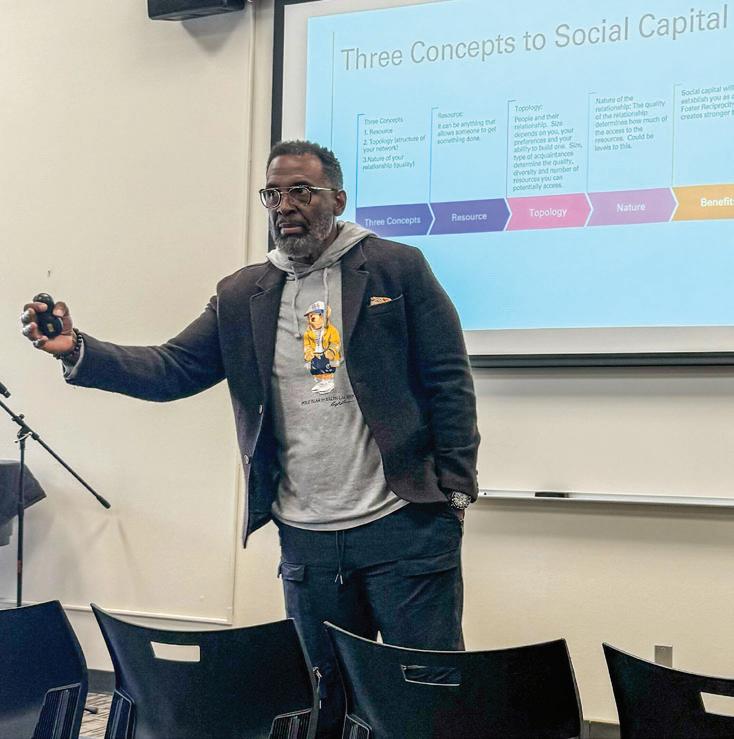
able with. It helps to make it easy to be approached.
“You got to go out and talk to people,” Sandifer Jr. said.
(continued from page 1)
Sample said they’re told it is because their events discriminate against other students, but she has never had anyone on South Campus approach her or other BSU members stating they felt left out.
“Yes, it’s focused on us because we don’t have any other space that’s focused on us,” Sample said. “[But] all people come, and we bond, and we get together, and it’s great.”
Executive board leader Sha’Tanae Lang said BSU strives to have everyone feel welcomed and comfortable when attending their events.
“We want everyone to learn about our history and just spread the love,” Lang said. “Not everybody’s the same, and we want to understand each other’s cultures. Even though we’re Black, there’s different nationalities and intersections that come with that.”
However, due to SB17 restrictions, BSU’s ability to educate others about their vast culture has been confined to a poster board and Instagram posts with information about important Black figures.
“There’s been a lot of censorship,” said Lang. “We have to work around what we can and can’t do and it’s kind of difficult, but we try to find a way.”
Anti-DEI laws state the removal of DEI’s presence will create fairness and make

everyone equal, but Sample said that’s hypocritical.
“Is it fair that when we’re independent and being ourselves, it’s too much?,” Sample said. “We’re not going to change ourselves just because others don’t want Black focused
on.”
While these laws try to suppress cultural clubs’ resources and abilities, BSU worked hard to put together multiple events for Black History Month, and student Kaleah Shabazz said she appreciated their efforts. She moved
to Texas in 2020 from a predominantly Black area in North Carolina and said it was difficult trying to find her community here.
“It was a cultural shock moving here from North Carolina,” Shabazz said. “So, this makes me feel a little bit like I’m back at home.”
When enrolling to TCC, she said she was empowered by BSU.
“This gives me courage,” Shabazz said. “I want to do more here and be more involved, because change doesn’t start with one person.”
As BSU members played a game of charades, one could hear their cheering from below SSTU’s staircase. Michael Fisher said he was drawn to the event because everyone was enjoying themselves. He’d only attended one BSU meeting before their game day but said from here forward, he will be a part of the organization.
“I’m here for fellowship with people that look like me and don’t look like me,” Fisher said. “[We] come and talk about certain topics and learn more about society and get different views.”
When asked if there was anything he’d like to say to lawmakers aiming to ban DEI, Fisher just requested one simple favor.
“Let us live,” he said.
(continued from page 1)
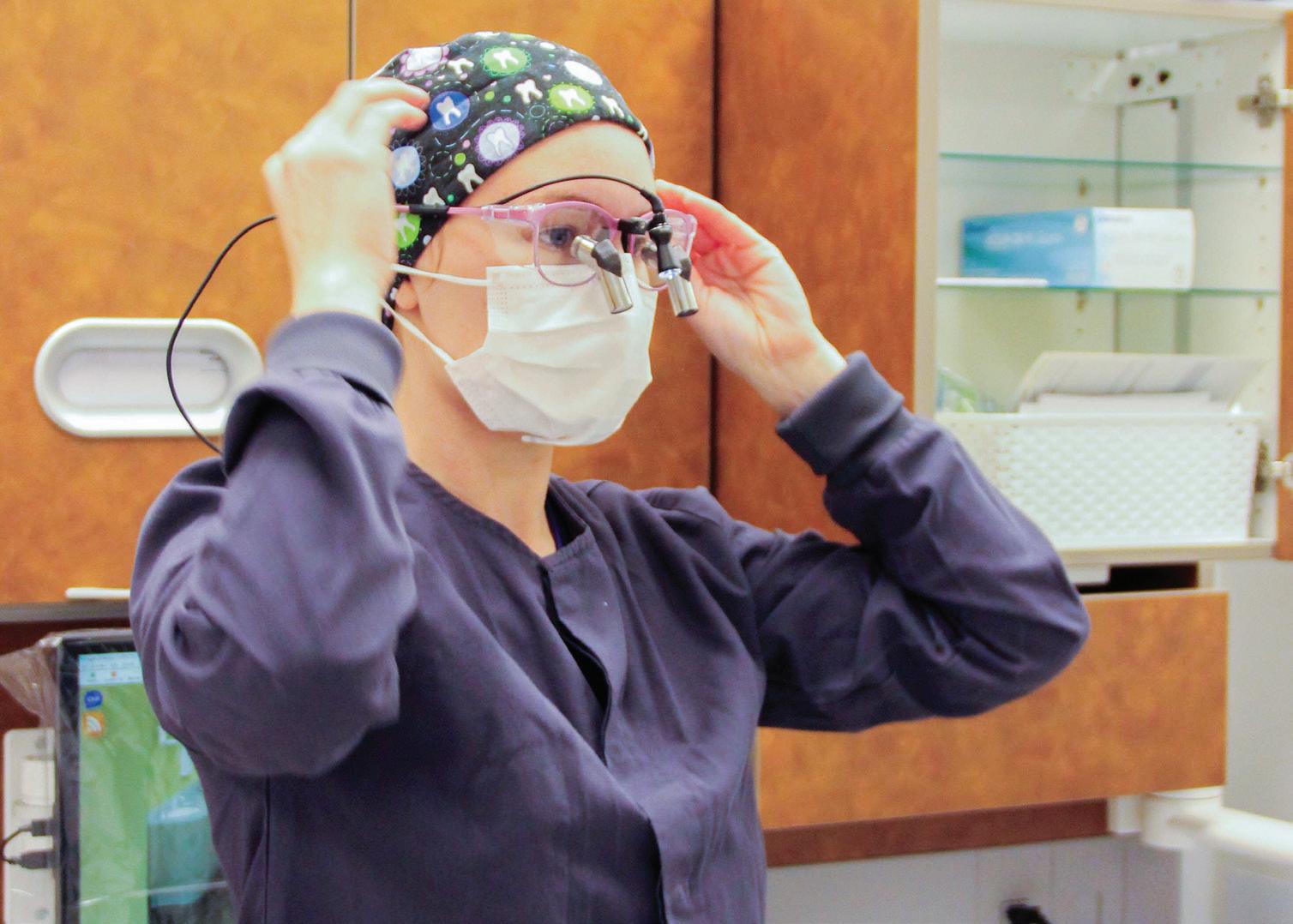
Emery currently works as a practicing dental hygienist and said she has fond feelings for what the program offered her.
“ These people want the best for you,” she said. “They want you to be successful. They’re willing to push you, and they know you well enough to know when you’re not giving it your all.”
Stephanie Bottomly is another recent graduate who is now an established dental hygienist. She came from a family that didn’t go to the dentist or put an emphasis on oral hy-
(continued from page 1)
entered the country as children.
“Some have wanted to go to college but they’re too afraid because of the future, whether it’s even worth it,” he said. “I have friends who are teachers and even they don’t know what is going to happen.”
He said family outside of the United States have reached out with concern about the increased mass deportations and risk of being detained.
“My family is being called from other family in Mexico to make sure we have our licenses, passports, any form of identity on us, to make sure we aren’t deported by mis-
giene, which pushed her to pursue dentistry,
“Me and a lot of family members suffered those consequences as far as having tons of work done on our teeth in later years, issues with gum disease,” she said. “I have parents that had full dentures, so being able to make an impact in that specific field was personal to me.”
Bottomly said being a dental hygienist is an opportunity for her to do better for those who have been in her position.
“I feel like I’m able to give those people
take,” he said. “Just because we can speak English, just because we don’t have an accent, we could still be mislabeled.”
Reginald Gates, vice chancellor for communications and external affairs at TCC, said he and the general council were still learning about the implications of the newest executive orders.
“However, there are currently no changes to our policies and procedures as a result of the executive orders,” he said.
Hurst-Euless-Bedford, Arlington and Mansfield independent school districts did not respond to our request for comment.
the knowledge and the tools to make better decisions, so they don’t end up in the same place as I came from,” she said. “My dad has diabetes. That was a huge aspect of how he ended up losing all of his teeth.”
She found the program to be rigorous and thorough but doable because of the support of her instructors and classmates.
“There’s a very diverse group of instructors who all bring something original and special to the table,” she said. “Learning from them has had a huge impact.”
Rebel Chapa graduated from the program in 2006 before coming back to teach as a first-year clinic coordinator. Chapa said it’s rewarding to see her students grow and change from their first day as students to the day they graduate.
“They have to put sharp things in people’s mouths, and that’s kind of scary,” she said. “Watching them kind of build those skills and start to trust themselves more is very satisfying. Once they kind of make it through the program, they feel pretty accomplished. They feel empowered.”
Brittney Henderson is working as a dental hygienist after graduating from the program in 2024 and said she’s living her dream job.
“It’s a lot of hard work, but its totally worth it,” she said. “It’s also really cool that an associates degree can get you there and you don’t need your bachelor’s to get paid the same out in your career.”
Dental assistant Giovanna Johnson said the instructors help students feel successful before working on patients. She said oftentimes, the first thing you notice about someone is their smile. Her goal is to help people
However, Fort Worth ISD released a statement to households following an increase in parental concern, promising their students would be supported, regardless of their background or immigration status.
“We enroll students without discrimination, regardless of their immigration status, in alignment with current legal requirements,” the statement read. “We maintain the confidentiality of all student records in compliance with federal law, specifically the Family Educational Rights and Privacy Act (FERPA). Access to these records is restricted to individuals with legal authorization.”
love that smile. “I love teeth, but in a more complex way,” she said. “I love being able to help people get back their confidence.”
A typical day as a dental assistant student starts in the morning or afternoon depending on your group. Johnson starts taking vitals at 8 a.m. and then begins preparatory work for the procedures for the day. Throughout the day, there are lectures and labs to attend. Otherwise, students are in the clinic, assisting with the treatment of patients.
“I don’t like when there’s downtime,” Johnson said. “But when you’re a dental assistant, there’s always something to do constantly. So you can’t really say like, ‘Oh, I had nothing to do at the time’ because there’s always something to do in a clinic.”
TCC’s dental clinic on NE Campus in the NHSC building offers $10 cleanings for students and the community. Mariam Akbar is a second-year dental hygiene student and said it’s rewarding to be able to serve people at an affordable rate.
“Periodontal disease is something not a lot of people think about, and that’s just really common now,” she said. “So it’s being able to change that, so their oral health is much better.”
The clinic is overseen by Richard Townsley, a retired dentist who now aids TCC dental students. He said he hasn’t had a bad student yet.
“I’ve been very impressed with the students that come into this program,” he said. “They’re very polite. They’re very well-mannered. They’re very patient-oriented, and they just want to do the best they can for their patients. It makes me proud to be a part of that.”
The district asks parents to update their student’s contact information should a parent or guardian be apprehended.
“In the event that any parents are detained during school hours, the district will ensure the safety of students until an authorized adult can pick up the child while complying with state and federal child welfare laws,” they said. They encouraged students concerned about attending school to contact their campus principal or assigned counselor and assured them the school could offer additional resources for students who need assistance.










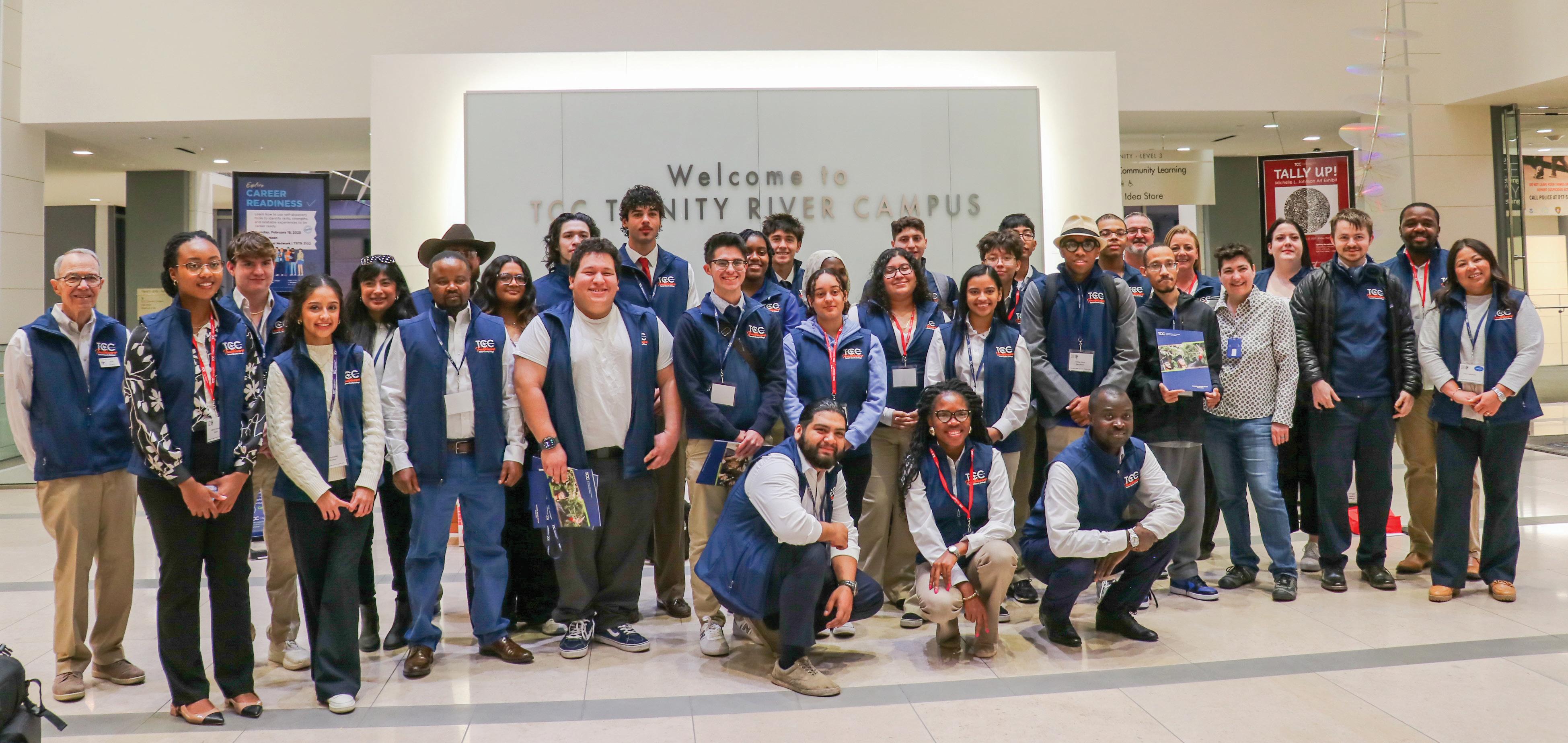
College Day
(continued from page 1)
Lowe, a DFW native and retired military police officer, told the students about his priorities for this legislative session. They include securing the border and stopping child sexual abuse in the education system.
He said one of his top priorities is to protect children in schools and on issues like Senate Bill 14, which bans gender-affirming care for transgender children.
“Ninety percent of the gender transitions start with psychological transitions hearing so not to be too graphic,” Lowe said. “But have you ever heard of a packer? No, that is a makeshift penis that will go in a diaper so that a little girl can think she’s a little boy at a very young age.”
Adio asked Lowe about child separation in the wake of recent ICE raids, detaining migrant parents with American-born children. She also asked how to motivate young Americans to care about achieving the American dream.
“Somebody’s gonna get the short end of the stick, right,” Lowe said. “But we have tons and tons of violence from this. When I worked at Collin County Jail, a majority of the illegal immigrants that ICE holds were there for sexual violence against kids, continuous sexual assault of a child under 14. So we are leaving our populations vulnerable.”
Adio said she felt unheard and didn’t leave the conversation with any information or advice to give the youth she works with.
“I felt like he had a made-up response to the question,” Adio said. “He didn’t really address what I wanted.”
SE student Sela Vo, who also asked about immigration, felt that while she respects Lowe’s opinion, there could have been room for a more nuanced discussion.
“I believe that if they want people to come in legally, maybe making the process to gaining legal citizenship should be made a little bit easier, and in turn, that could help their concerns with coming here legally,” Vo said.
A group of South Campus students met with Rep. Nicole Collier, House D-Fort Worth District 95. They asked about House Bill 8, Senate Bill 17 funding, DEI and the student employees’ work-study program.
Lauryn Sample, who is on the Black Student Union executive board at South Campus, was especially concerned about the cultural censorship that is creating on college campuses.
“It’s really just so unfortunate,” Sample said. “Because it’s really dimming our motivation to fight to be able to be black.”
Collier said that SB 17 and bills like it are designed to make things difficult, and there isn’t clarity due to the conflicting messaging from the government.
“We need clarity, but that is incumbent upon us to demand it,” Collier said. “That means you got to get engaged. Keep pressing,
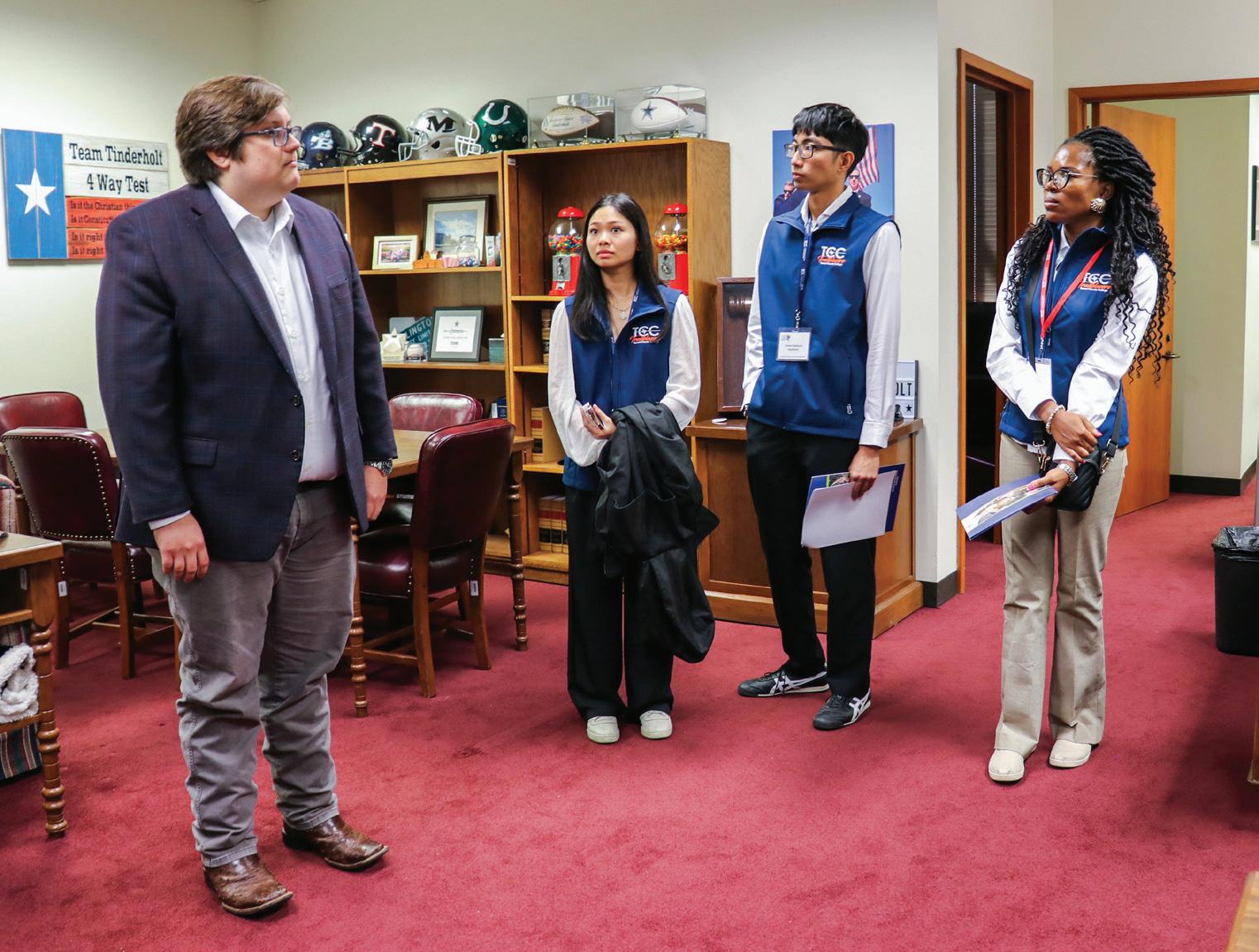
“You never know the impact you’re going to make on these representatives, and it’s wonderful that we have that opportunity.”
Sela Vo SE Campus Student
you know, find out where that line is. You know, the line is moving, then find out where it is.”
During the discussion about the possibility of U.S. Immigration and Customs Enforcement officers targeting illegal immigrants on college campuses, students brought up that some people are choosing to skip classes rather than risk deportation or their family members being deported if they drop them off at school.
“We’re literally living in uncertain times,” Collier said. “And when it comes to that, I don’t even have a way to reassure you. I don’t have those words to say it’s OK. This is what you do.”
Not all the students could speak with their representative because it was the start of the new session, and committee members had
not been assigned yet. That left some offices closed, and some students could meet with aides to ask questions about their representative’s policy leanings.
Asia Barfield, Leslie Zacarias and Madelin Alvarenga from SE Campus expressed their frustration at not getting the whole experience.
“I don’t know what the circumstances were,” Zacarias said. “ But I’m pretty sure a lot of us did have that problem of not actually talking to the representative or the senator. So, I think maybe for the future, that’s something that they could plan out.”
Barfield was supposed to meet Representative Chris Turner from D-Grand Prairie District 101, which covers SE Campus.
“I would say it was a bummer that Chris Turner actually wasn’t there, but nonetheless, his team represented him very well,” Barfield said. “Despite him not being there, they were able to get his ideals across and explain the kind of bills that he passes. So, all in all, I was pretty confident with the answers that I received.”
Students said meeting their state senators and representatives gave them a chance to have conversations that they would not otherwise have had.
“You never know the impact you’re going to make on these representatives, and it’s wonderful that we have that opportunity,” Vo said.
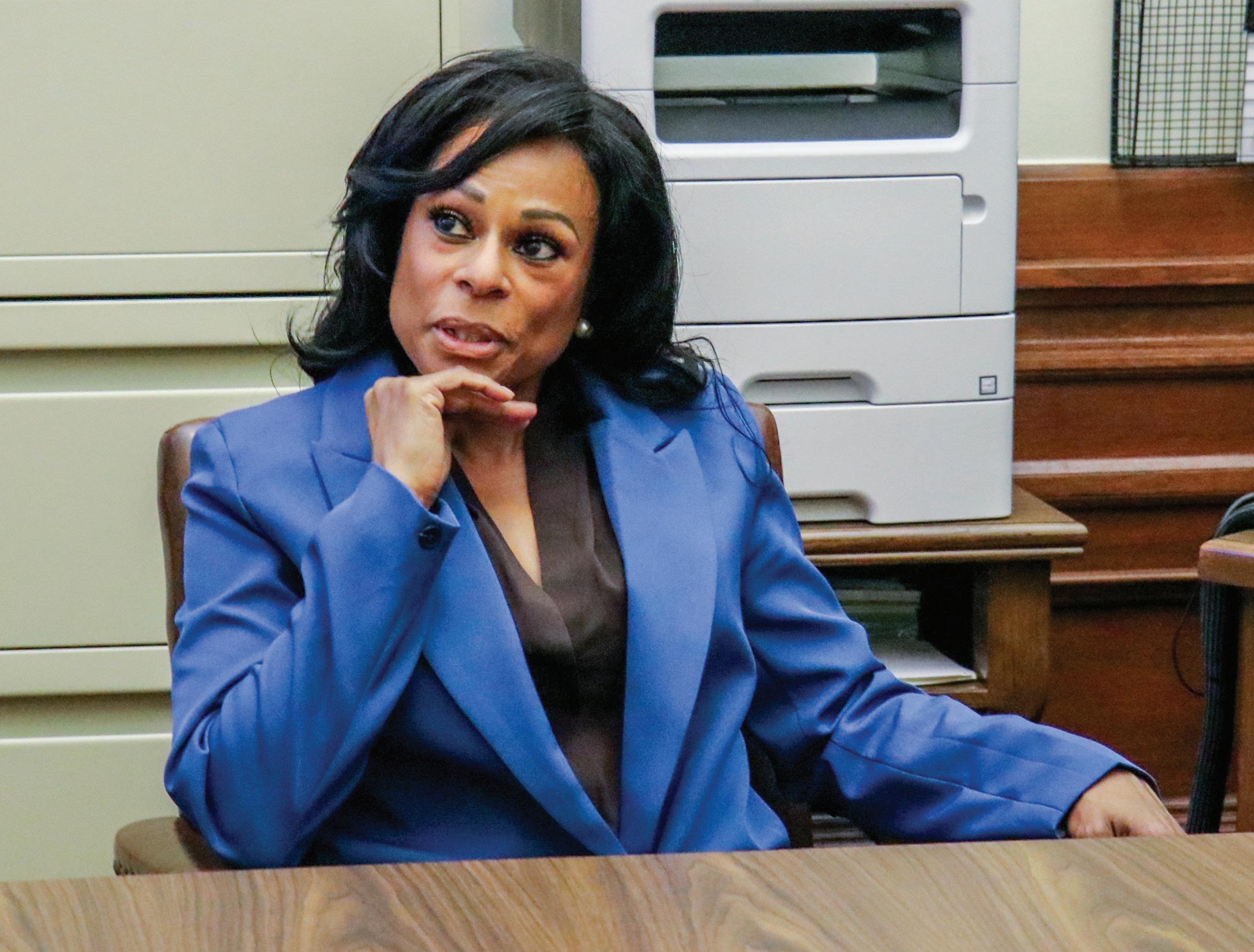
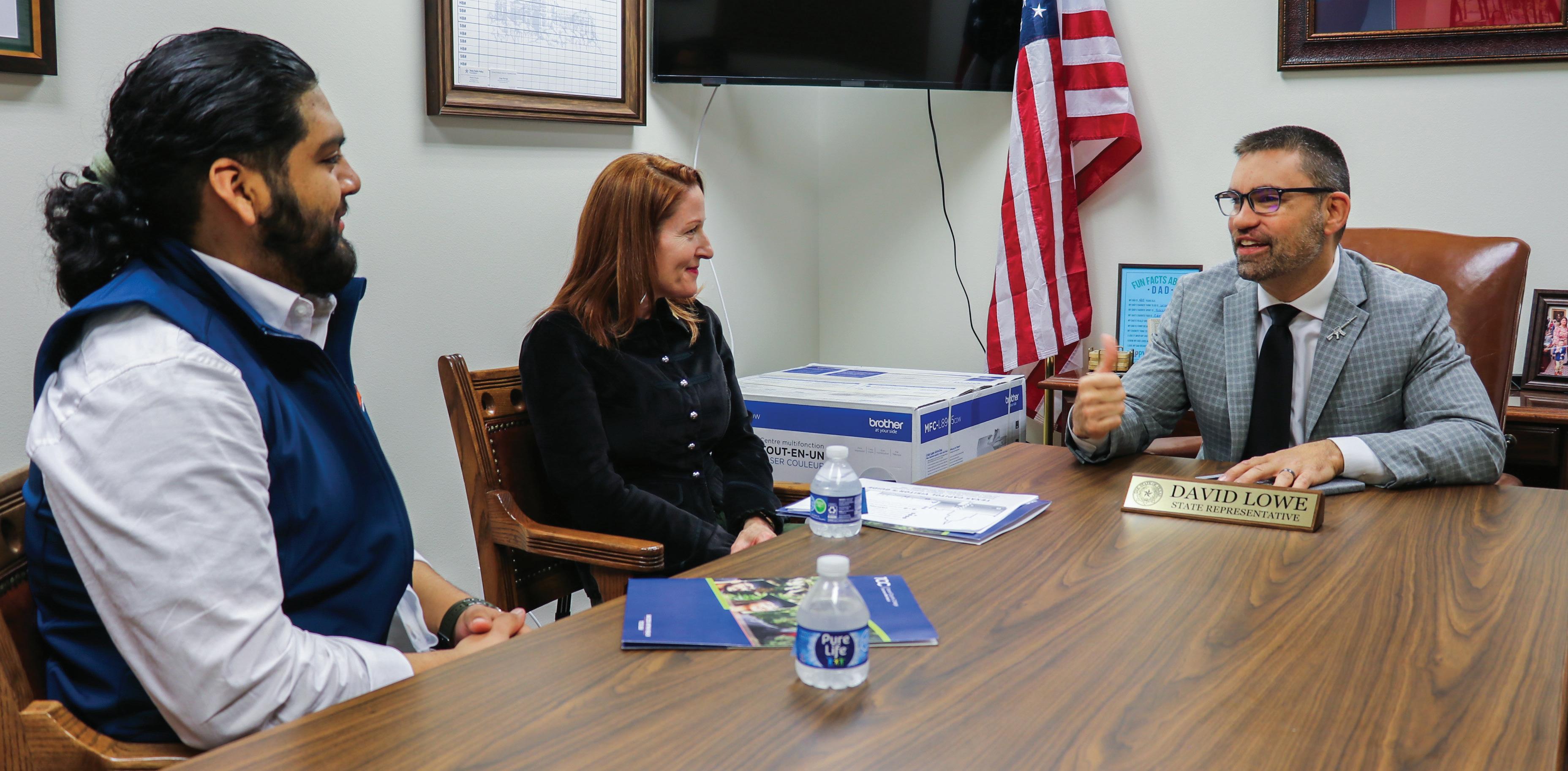
Artist explores humanity through her craft
Colorful prints depict relevant societal topics
FRED NGUYEN campus editor collegian.editor@tccd.edu
Fort Worth artist Michelle Johnson explores the ways society and the government often reduce people to numbers in her solo exhibition “Tally Up!,” on display through March 7 at TR Campus.
Johnson uses various methods in her intricate prints such as woodblock and screen printing to produce dully colored, abstract depictions of issues she has seen in society.
This shows up in the work as hundreds of lines of binary code printed over simple figures of people, often in chaotic ways.
These are layered over each other in different colors and variations to tell different stories.
Johnson was inspired to use binary codes in her art after seeing data from the telecommunication company AT&T, where personal information can be encoded into strings of ones and zeroes.
Johnson said she wanted to bring humanity back by not looking at people like statistics.
“We should just really make the effort to stop trying to dehumanize people and to see them as numbers, and just begin to see people as people,” Johnson said.
Drawing from her experience as a military medic, Johnson addresses various facets of societal issues like the health care system in both humorous and somber ways.
In one piece, she depicts the humorous story of a patient she treated through a few lines of text resembling a medical report.
On another, she illustrates the struggle of being a woman living under a health care system that doesn’t listen to her problems through words in the art like “reassess” and “DSM IV,” referring to a guide used to diagnose mental disorders.
Johnson said the lack of effort by the medical world in America to empathize with their patients meant that many women feel
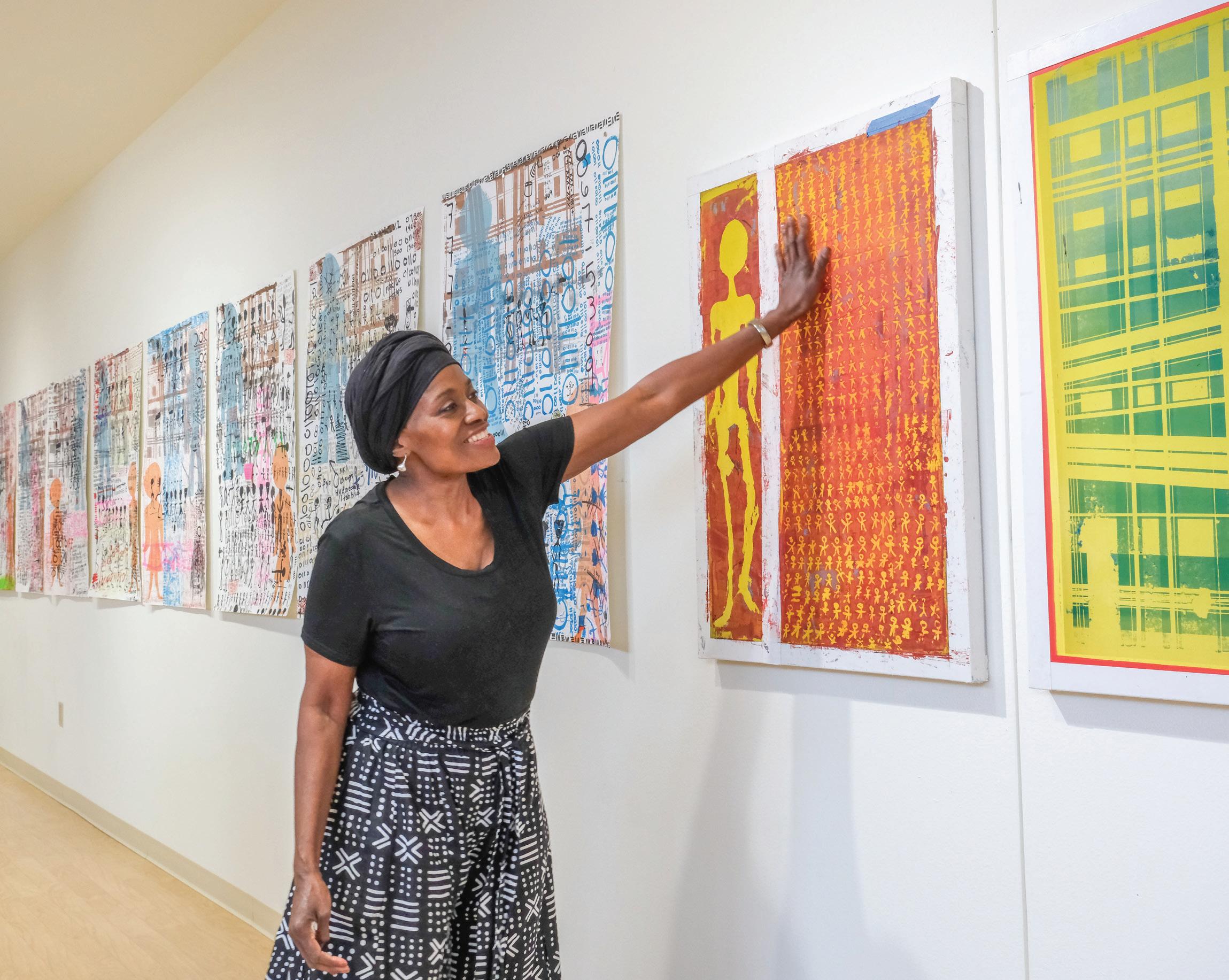
like they aren’t being cared for.
“We still have the highest numbers in this country of not being heard when it comes to women’s health care,” she said. “[Women are] not being listened to, being misdiagnosed, having surgery they don’t need.”
TR art student Brendon Lane was especially curious about the multilingual aspect of Johnson’s prints.
On one piece, Johnson used alphabets from languages like Russian, Ethiopian and Greek to create patterns resembling those seen on ancient stone tablets, which Lane

MOVIE REVIEW
For the optimal viewing experience, “Companion” needs to be seen with no idea what’s about to happen. So this review will conceal the plot as much as possible.
The film starts with a typical meet-cute in a grocery store. Pretty girl-next-door, Iris is charmed by Josh’s clumsy charm as he knocks over an orange display after locking eyes with her.
But the initial love-at-first-sight crush snowballs into a mess of regrets and chaotic emotions with nowhere to go but an inward collapse.
The impending doom of their “perfect” relationship satisfyingly plays out on screen. Iris, played by Sophie Thatcher, transforms as she learns secrets that change the trajectory of her life forever. There’s no turning back once the first thread unravels in the film, only watching as it comes undone completely.
Iris is brimming with emotions she can’t name, which shows in the way she walks, talks and composes herself.
Thatcher portrays this intensity seamlessly. The way she acts with her eyes is particularly compelling. Her strong, puzzled,
or frightened looks perfectly portray the feelings Iris is going through in each scene.
Thatcher’s sharp performance makes up for the film’s muddled message. It’s something to watch for the thrill rather than anything else.
Her co-star, Jack Quaid, also delivers a strong performance as the love interest with an underlying narcissism problem. His ability to play a challenging character so effortlessly makes him an easy antagonist to root against.
Sometimes, a film with a simple thrill factor and a fun outlandish concept is exactly what’s needed. For me, there’s no need to dock points or discourage people from watching it even if it has a bit of an empty core. It’s still exciting and finds its merits in the performances, visuals and fast pace.
For example, the tense opening act hooks the viewer in immediately. The film starts with Iris’s sharp inner monologue sharing her insecurities about her purpose with the audience. She then reveals the two times she ever truly felt happy. The first one is the day she met Josh, and you’ll have to watch the movie to find out the second one.
In the 97-minute runtime, the audience witnesses the explosion of a ticking time bomb. It’s more like 10 or so mini bombs back-to-back.
It’s easy to root for Iris as she survives
compared to the Rosetta Stone.
“There’s very few pieces in the world that touch on so many different cultures at once, but that one particularly does a good job of showing that we’re not just one culture,” Lane said. “And that there are so many different cultures, but we’re all part of the same tapestry of humanity.”
Johnson was also inspired by slave ship logbooks, and many of her pieces depict how slaves were dehumanized in history.
TR art student Megan Meier said those themes were clear when she saw Johnson’s work for the first time.
“It really comes across in her work in that you see the figures and the numbers and that she’s layering all those together,” Meier said. “It’s really beautiful in how they kind of create a picture of how messy that is.” The value of people is the main theme in the exhibit.
Johnson said society should make an effort to treat people humanely and see the human factor in society. “Sometimes, when you turn people into numbers, it tends to dehumanize people,” she said. “It causes others to devour another person. Because all you see on paper is the statistics.”

each one. Her character is sympathetic because of her unfair circumstances and nothing-left-to-lose mentality alongside her relatability factor coming from her wish to belong and discover her greater purpose.
The loose commentary on topics including misogyny, loneliness and commodified relationships aside, it’s still a good time. It just took on too many themes to explore at once instead of fleshing out just one. “Companion” makes up for it with its shiny exterior. It’s pretty to look at even though what’s inside is nothing special.
Another successful part of the film is the director’s genre-blending vision. The film goes from rom-com to horror to scifi in an easy balance that isn’t chaotic. It’s exciting to see the experimentation with tropes overlapping in each genre and how it all meshes.
My favorite part about “Companion” is its addition to the running “good for her” cinematic universe list with the trope of an unapologetic female character making it to the end, a bit bloody, and obtaining the life taken from her.
A quick and easily digestible watch with a satisfying pay-off, made all that much better if you don’t know anything about it going in, is exactly what’s needed to turn your brain off for a second and simply have fun.

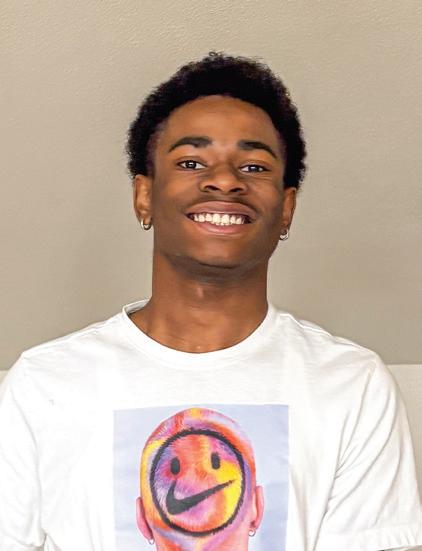
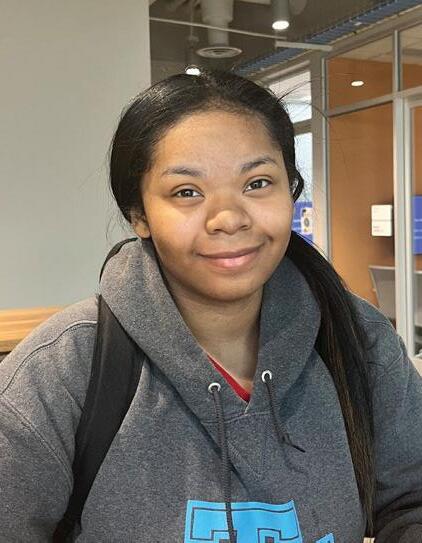
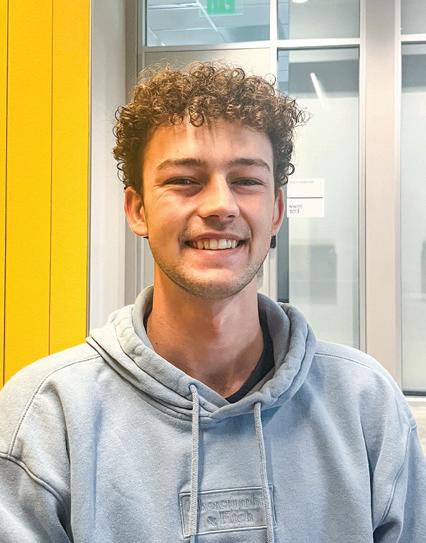
CAMPUS VOICES

“I feel like it would affect me pretty harshly. FAFSA is what got most of us here. So I think with that being taken away, most students would be under a line they wouldn’t be able to cross. Especially the students that work and are trying to get to a point where they can graduate college and go into the career field”

“It would impact me greatly because I use financial aid to go to class. It’s the only reason I’ve been able to even have classes as a whole. It makes it easier for my family to afford other household expenses. Students want to go to college. Their parents want them to go to college, but students feel bad having to ask for money to go to college.”

“I would have to dedicate more time to working to pay for TCC. The Pell Grants get me pretty far. I could pay for it, but I would rather not have to. Dedicating more time to work would mean less time studying and would mean a lot of my social life might even get taken out.”
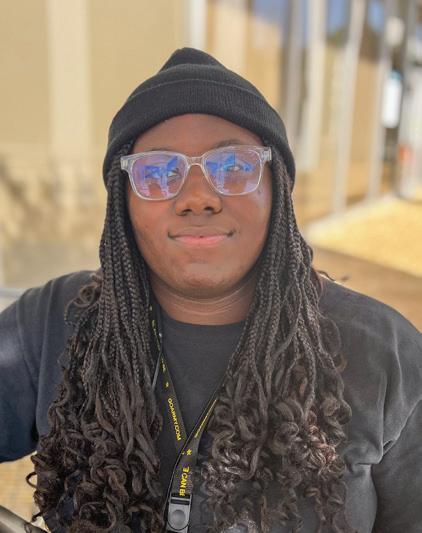

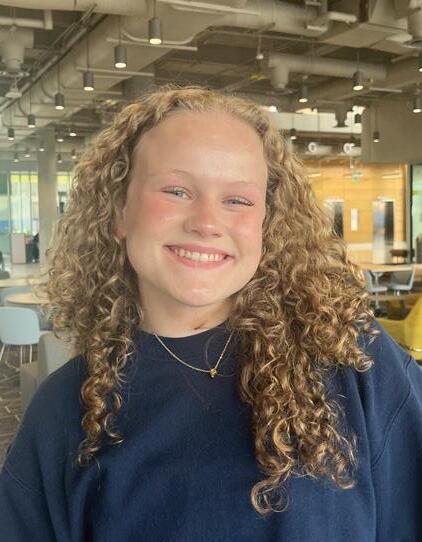

“It would affect a lot of different people in different branches of education. A lot of people would miss out on opportunities, and a lot of impoverished kids that are predominantly colored would really be affected by this issue. [Minorities] already don’t have enough. We already don’t get supported a lot.”

“I go to college for free. So if I didn’t have any financial stuff for [the government] to handle, I wouldn’t be here. I wouldn’t be getting my education. Losing that would lose every job opportunity that I’ve ever had.”

“It would impact me because I would not have as many credits going into college and I would have less of a chance of getting into a good school. My schooling wasn’t getting paid for, I wouldn’t be here.”
DISTRICT CRIME LOG









Free lunches help feed student success
The recent attempt by the Trump administration to freeze federal grant funding has revealed that some lawmakers are out-of-touch and unempathetic.
On Jan. 27, a memo from the Office of Management and Budget was sent to all federal agencies to temporarily pause their activities effective the next day. This caused a maelstrom of confusion across the nation.
On the day after the memo’s release, Georgia Rep. Rich McCormick appeared in a CNN interview praising the move by the Trump administration.
When asked how this would affect federal agencies, including those that provide school lunches, he launched into a rant about how he spent his childhood working and that kids should work to pay for their meals.
McCormick echoed a familiar conservative philosophy when speaking of government spending unrelated to the military or expensive AI projects: The poor should pull themselves up by their bootstraps.
McCormick and those like him don’t seem to realize that these free school lunches aren’t a loophole for kids to live off government money.
These free meals can be the difference between a good day and a bad day for food-insecure kids.
According to the U.N. World Food Program, children need proper nutrition for healthy development and to fuel their brain functions. Without
VIEWPOINTS
these necessary nutrients, a child’s ability to learn could be negatively impacted along with their physical health.
Yet for many children, the only meal they get each day is at school.
In 2023, almost 18% of American households with children faced food insecurity, according to the U.S. Department of Agriculture. As citizens struggle to survive and pay their bills, it is hard to see how McCormick expects every child to help their situation by working for a minimum wage that hasn’t changed in more than 15 years.
To say that children who rely on free lunch just don’t want to work is ridiculous and ignorant.
The reality is some children live in poverty and don’t have easy access to food. Free school lunches could be one of the only ways these children can consistently have food throughout the day to ease the burden they feel at home.
Removing funding for programs helping hungry children is wrong. Food should not be a luxury and helping the poor should always be the priority of any nation.
Conservatives like McCormick seem to want children to grow up quickly and become financially independent.
But what about disabled children, children who are too young to work and children without reliable transportation to the workplace?
Many factors could prevent a child

from working, even without looking at child labor laws.
McCormick and those like him have a lack of empathy for the Americans they are supposed to lead.It’s especially disheartening to hear this from a representative of Georgia.
In 2023, Kids Count reported 18.8% of Georgia’s children under the age of 18 were living in families with incomes under the poverty line.
It is puzzling how McCormick
Crackdown on immigration leaves DFW families scared
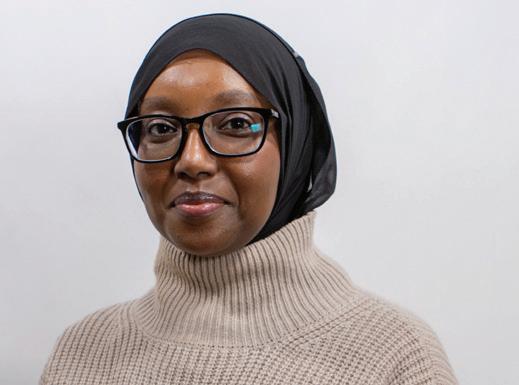
FOUSIA ABDULLAHI editor-in-chief
fousia.abdullahi@my.tccd.edu
Students and families in Texas and other red states are left reeling from how they will be affected by President Donald Trump’s recent executive orders relating to immigration.
The fear of U.S. Immigration and Customs Enforcement agents coming into previously protected areas like schools, churches and courthouses leaves undocumented immigrants and even legal immigrants planning for the danger ICE poses to their community.
Some college students are anxious about their ability to attend classes, so they are choosing to skip classes or pause their academic dreams until things die down.
Parents of younger students are concerned about whether they’ll be separated from their children during school hours. Who will pick up their kids? Who will watch them until the parents are back? Will they be deported with their children if that’s what they choose?
Parents have to plan for legal guardianship and medical directives in case they get picked up outside of school, and the child is unaware. This is a nightmare for families.
Another fear is ICE officers will come into the school system and take students who are undocumented immigrants, violating students’ rights and privacy. For that matter, legal citizens also fear they will be detained if they don’t have a valid ID.
Knowing your rights will help ease some of the anxiety. The American Immigration Lawyers Association provides a list of things to do if you are stopped by ICE, including that you may ask if you are free to leave. If the officer says no, you may exercise your right to remain silent, and you have

the right to immediately contact a lawyer. If you don’t have one, tell the immigration officers you want to speak to a lawyer. You can refuse to sign any and all paperwork until you have had the opportunity to speak to a lawyer.
These topics are being discussed in classrooms, lunchrooms and playgrounds nationwide. The uncertainty is impacting the mental health of families. Young kids, teens and adult learners are all afraid for themselves, their parents, extended families and friends.
Educators are yet again put in a position to protect their students when their government fails to do.
Texas state Rep. David Lowe, R-North Richland Hills District 91 gave a shocking answer to students during Community College Day at the Capitol Feb. 3 when asked about immigration and closing the border.
“If we do not prioritize America, we are going to go down and we are going to turn into places like France, where they are being overrun by people that were not from their country,” Lowe said. “They did not support cultural appropriation, etc. It’s changing the fabric of our nation.”
Some people take comments like this to be extremely disheartening. The Trump administration and its supporters weaponize the importance and safety of children when it comes to health care and education. But then, they dehumanize children of immigrants in the same breath.
When you tell people to use the proper immigration process but then fail to streamline it through low-cost, speedy fillings and hiring more immigration agents to process cases and blanket-ban asylum, it leads to even more determined people taking desperate measures such as illegally entering through our borders.
As someone whose family fled from civil war and economic scarcity to find safety in North America, my parents only wanted to secure our safety and ability to live a full and happy life.
Creating a better America should prioritize giving shelter to families that are fleeing poverty, crime or lack of education, not hindering their success.
thinks getting rid of federal funding could help the impoverished citizens of his state and the nation. Even more concerning is how the Trump administration has shown interest in cutting programs that would help Americans easily access healthcare, food, education and housing. In a poll by the Food Research & Action Center in 2021, 63% of voters nationwide said they supported free meals for students. It’s obvious that
responsibility to help them overcome obstacles in their education. We and the government should do everything in our power to help the hungry and poor instead of telling them to just work harder.
Frozen food’s quick, easy convenience is killing us
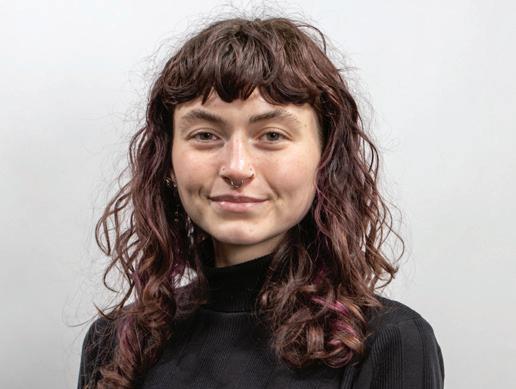
Hurry, the clock ticks and as each second passes the day’s lengthy schedule is soon to begin. There is no time for cooking, and especially not cleaning.
So, throw a plastic container full of promised nutrients into the microwave, and let the 2-minute heat waves cook mushy chemicals into morning’s encouragement.
Preparing food has become an inconvenience, and it seems almost impossible to incorporate cooking into an already busy agenda
Fortunately, trustworthy food corporations of America recognize the hard-working members of this country and provide a vast selection of instant cuisine perfect for those on the go.
With simplicity and ease, frozen foods and instant meals are prepared in minutes, but at what cost?
Preservatives, stabilizers and dyes found in these products cause hazardous side effects. Added directly into the dining experience for preserving, an overexposure to these products damage the human body.
Thyroid and immune system failure, growth and metabolic disorders, neurotoxicity as well as behavioral and learning difficulties are just a few of the side effects from chemicals consumed by Americans daily.
In 2023 Americans purchased less than 10% of their daily average of 4,000 calories on food prepared at home. The remaining 90% of calories were spent on instant and frozen foods, snacks or restaurants, according to USDA’s Economic Research Service.
CDC reports show the prevalence of morbid obesity has steadily increased by 9.4% in the U.S. within the last 10 years.
As American’s physical health rapidly declines, so does their mental health.
Major depression is the most common



mental disorder in the Country, with 61% of adults aged 18 and older receiving treatment for depression according to the 2021 National Survey on Drug Use and Health. It isn’t breaking news learning nutrients put into the body affect how it functions, but knowing almost every product in a grocery store has directly or indirectly been in contact with harsh chemicals actively killing us is.
Rushing from one place to another makes cooking seem like a chore, but it is purest form of self-love anyone can practice.
Setting aside time to prep, cook, dine and clean shouldn’t be daunting. Not every meal has to be complicated and picture perfect. Carrots, celery, tomatoes, Japanese sweet potatoes, spinach with fresh garlic and shallots on top of basmati rice seasoned with umami and black pepper. It sounds like a mouthful but is easy to prepare.
Roasting potatoes and cooking rice in the oven is mindless. While those cook, I chop away while listening to a new album or podcast. After the short 5-minute dice, I sauté the remaining vegetables in a pan with avocado oil then add everything in a bowl once it’s all finished.
This time taken to prepare something for myself, knowing I made it for me, and I get to enjoy it and clean it up is therapeutic. I control every step for myself. If there is a mistake the fun thing about cooking, is it can be turned into something new.
Experimenting with new flavors and deciding for myself if I like it, without the critique of others, makes it even more exciting.
With the Country’s daily overwhelming news, this time to slow down and nourish myself through my own actions allows me to realize my strength and power to prevail.
I’ve never been one for self-affirmations or grounding techniques, and I’m not capable of meditating. Therapists would give me homework to practice those techniques, but it never worked. I just gave up on it, believing I wasn’t made to sit down and relax.
But after establishing a cooking routine in my daily life, I began to realize preparing a well-balanced meal, I can feel and interact, with was therapy. When life gets out of control, anxious and overstimulating, there is no better way to get out of that than through self-serving actions like cooking.
“
What we’ve really tried to place a heavy focus on the last two years is treating people like they’re a member of your family.”
Near-tragedy chief’s tenacity
TCC grad oversees DFW Airport firefighters
Daniel White Fire Chief
As a long-time first responder, Daniel White never envisioned experiencing the other side of his work, until one summer his son’s life nearly ended, changing his perspective.
“Long story short, my boy, Owen, was floating face down in the pool,” he said.
White’s son nearly drowned when he jumped into a family friend’s pool without a floatation device. While White and his wife were able to revive their son with CPR, a responding Azle Police Department officer showed him the impact of emergency personnel and the importance of high-caliber treatment for every victim.
“The officer moved with a sense of purpose,” he said.
“He was professional. He knew where his automated external defibrillator was and he was ready to roll. That’s why I know that it matters.”
Daniel White oversees DFW Airport as fire chief, the second-largest international airport with 81 million travelers annually. His journey began as a medic in the Airforce leading him to NW Campus’ paramedic academy.
“[The academy] opened my aperture,” he said. “My biggest takeaway was the value of perspective, understanding the common challenges among the cities, jurisdictions and how we then share with each other. It’s built associations that when another department has an issue, we can help.” Now as a leader, White wants his firefighters to display the same level of tenacity that saved his son’s life.
“What we’ve really tried to place a heavy focus on the last two years is treating people like they’re a member of your family,” he said. “The person you’re encountering, no matter how ill or critical, they’re someone’s family member.”
White believes how well his team treats others starts internally. Immediately following his promotion, he worked to bring back connection and communication.
“The department was going through a huge transition,” White said. “We had the grand opportunity to reset the focus, reset the table and start anew.”
Mark Gray, a captain for the regulatory compliance and planning commission department, said those characteristics were neglected by White’s predecessor.
“Our previous chief played everything close to the vest,” he said. “Information was power and he didn’t want to share it. [White] knows all the new guy’s names. There’s been some past in our hierarchy that would have to look down at your shirt to know
who you are.”
Gray said White continuously went above and beyond to lead and support his staff.
“There was a firefighter specialist whose mother passed last month,” Gray said. “Dan was standing next to me at the funeral. I don’t think our previous administration would have even known [she had passed].”
As he moved through the ranks, White said he had his share of mistakes, particularly when leading tenured members of an unfamiliar department.
Mario Herrera, a captain in the fire marshal’s office, said with each error, White took accountability.
“[White] takes ownership for all of his decisions,” he said. “He’s touched a bit of every department, so he really takes ownership of the fire department as a whole.”
That commitment to finding solutions was what helped shape the department into what it is today, Herrera said,
“He brings the family feel to the fire department,” he said. “You look to leadership as an example, and so from him taking an interest in us, it makes us committed. It makes us want to be invested in our work.”
White said with his opportunity to set the tone and expectation for his firefighters, he always wants the job to start with professionalism.
“When an ambulance comes to my house or when a fire department shows up, does it matter that they have highly shined boots and that their uniforms are not creased?” he said. “But it gives the appearance of confidence, of people that have it together and are ready to roll.”
His time in the military instilled his dedication to professionalism, and his role as a medic was White’s biggest passion in public safety, but he never envisioned his title as chief.
“I was pretty passionate, sometimes to a fault,” he said. “At a certain point, I realized, I should be a contributor, and how do I contribute in each level to improve what we’re doing here and not complain.”
He said a lesson he’s still accepting is that while his love for being a first responder started on the field, his responsibilities now reside behind the scenes.
“That’s a personal challenge for me, relinquishing certain things to take on a bigger role, a bigger frame, and now being more of a coordinator,” he said. “You’re managing people, and their expectations and sometimes their emotions. It’s valuable, and you can’t turn away from it.”
Assistant Fire Chief Crystal Whiteside, recounted a time when White served as a collaborative leader who helped to search for solutions without undermining his team
“We had two aircraft alerts going at the same time, and he showed up, knowing that I was a new

battalion, and stood by my side and didn’t try to take over the call,” she said. “He was going out to the individuals on the aircraft, reassuring them and seeing if they needed anything. He was involved, but he was letting his leaders lead. He was finding roles to lead in other ways.”
She said White leads first with compassion and seeks to understand, utilizing the skill sets and personal passions of each firefighter.
“There’s a higher level of productivity,” she said. “We work to support him because that’s somebody you want to work for.”
Along with boosting employee morale, this approach brought positive changes for the people they serve, including increasing survival rates in a cardiovascular emergency.
“We’ve gotten feedback from family members and from people we’ve treated. We do engagement scores every year and the fire service has done incredible,” he said. “We probably lead the nation in many of the metrics that relate to cardiac resuscitation, and it’s because of a system that’s taken commitment and people that believe in it and execute.”
However, for White, the well-being of the community he serves is the most important measurement.
“The real metric that we focus on is actual survival,” he said. “Survival doesn’t mean you just make it to the hospital with a pulse. It means you made it to the hospital, you left the hospital and you went home to your family.”
Throughout his 17 years of serving alongside White, Gray said his intensity and determination continued to keep his staff at ease.
“I was never afraid when Dan was on the call because he took charge,” he said. “He would tell you exactly what he needed, and he was a calming influence in the midst of chaos.”
